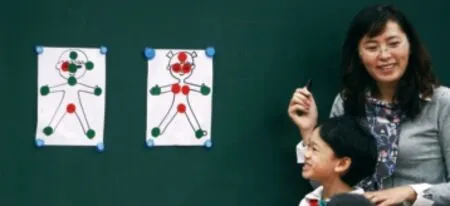TEA LEAVES
SHAMEFUL SILENCE

CHINA CONTINUES TO LAG BEHIND IN SEX EDUCATION
The high-profile case of a Shandong businessman accused of raping his adopted daughter over a period of three years has highlighted the consequences of the lack of sex education and sexual assault knowledge in China.
As reported by South Review magazine, the alleged victim,Xingxing (pseudonym), was unaware that she had been raped by the perpetrator at age 14 until she looked up online medical advice on vaginal bleeding. Following the online doctor’s advice, Xingxing decided to call the police for help, though they repeatedly failed to act (the case is now under investigation by a working team dispatched by the Supreme People’s Procuratorate).
According to the SPP, 32,500 cases of child molestation were heard and adjudicated by Chinese courts from January 2018 to October 2019. The Girls’ Protection Program at the China Foundation of Culture and Arts for Children stated that the majority of sexual assault victims are minors, and most are subject to forms of sexual assault other than rape—meaning that they or their guardians may not realize they have been sexually assaulted, and may refuse to seek help due to a sense of shame.
Sex education in China began as early as 1910, when the writer Lu Xun taught physiology courses in Hangzhou secondary schools.However, students were ashamed of the sensitive topic, and Lu reportedly could not keep the class from giggling when he talked about male and female genitals.
In the 1960s, Premier Zhou Enlai hosted a symposium on sex education with 10 experts, who published relevant articles in newspapers and received more than 1,000 letters from teenagers across the country on sexual health. In response, the experts published a series of papers on the topic, and this led to the introduction of sex education in schools.
However, in a culture of sexual shaming, efforts to promote sex education face frequent setbacks.In February 2017, a series of books entitled Cherishing Life: Sexual Education Manual for Pupils, published by the Beijing Normal University Publishing House, was boycotted by many parents for “shameless” content. In the ensuing backlash, the manual was pulled from bookstore shelves, and is reported to be undergoing revisions.
Sex education in public schools is mandatory, but is euphemistically known as “adolescent health”education, and there is no fixed curriculum. “Many schools…only cover the biological aspects of sex,”renowned sexologist Pan Suiming wrote in a book in 2009. “They basically don’t cover sexual values,behavior, and rights.”
Parents also express negative or secretive attitudes about sex, leaving children and teens ignorant and vulnerable to misinformation online.According to a survey by Girls’Protection, over 68 percent of over 9,000 parents in 31 provinces failed to teach their children about sex.
Since 2018, Girls’ Protection has been providing classes on selfprotection and sex education to 2.3 million children and 490,000 parents across China, including online courses, advice for children on protecting themselves from sexual assault, and training for sex educators.
“We cannot just rely on schools for sex education,” Tong Li, the general secretary of the China Sexology Association, noted at the first China Sexologist Conference held in Beijing in 2018. “Media and non-governmental organizations have some responsibility, and governments and relevant authorities need to support them…in vigorously disseminating high quality sex education. Everyone has a part to play.” - YANG TINGTING (杨婷婷)
BLIND SPOTS
News of an undercover policewoman denied boarding on a Shanxi bus due to taking along a guide dog has renewed attention on the lack of accommodation for the visually impaired in China.
According to Chinese law, service dogs are allowed in public buildings and on public transportation, but the dog’s owner, a visually impaired man surnamed Gao, told media he experiences rejection “almost every day” from ignorant transit staff, as well as passersby fearful of canines.
The number of trained guide dogs in China is also pitifully low, with less than 200 serving a blind population of over 17 million. “There must be detailed regulations to protect the rights and interests of the visually impaired, and more financial support is necessary for training centers,” Zeng Xin, a culture coordinator at Hongdandan, an NGO for the blind, tells TWOC,“Most importantly, [we need to]raise public awareness of disabled individuals.” - Y.T.

NATURE NOSTALGIA

Food and rural lifestyle video blogger Li Ziqi is trending abroad, having increased her YouTube following from 8 to 10 million subscribers, around a third of whom are based in the US, UK, and Canada, in 2020.
The 30-year-old from Pingwu, Sichuan province, is already famous within China for making ginger tea from roots in her garden, hewing bamboo furniture,dyeing clothing using grape skins, and doing other DIY crafts. Her homespun lifestyle and idyllic cinematography strike a chord with fans who are disillusioned with consumerist society.
“We’ve gotten to a certain point of materialism and consumption where there’s only so much you can buy, and we’re like, ‘What other experiences can I have?’” Linda Qian, a PhD candidate at Oxford researching nostalgia’s role in revitalizing China’s countryside, told The Guardian. In 2017, China’s Ministry of Agriculture estimated that 7 million “entrepreneurs” have returned from cities to start businesses in the countryside, 40 percent of whom have at least high school education. - DANIELLA SILVA
LETHAL EDUCATION

In April, a three-month-old infant suffocated to death while sleeping face-down as her mother watched through a baby monitor, allegedly on the advice of a payfor-access parenting account known as “Cheese Wonton” on WeChat.
China’s early care market has been booming—there were 72,000 businesses registered to offer related services as of 2017, and the number of users on online early care platforms was expected to reach 204 million in 2019. However, the industry lacks qualification standards. “Cheese Wonton” categorizes its service as“medical care and health consulting,” but offers no credentials in this field, and its founder had previously declared that all her knowledge was self-taught.The Shanghai company has stopped operating, and is being investigated for exceeding its “business scope.” Its founder maintains she cautioned followers about the risks of this sleeping technique, and public opinion remains divided on whether responsibility lies with the platform or parents who take advice without due diligence. - SUN JIAHUI (孙佳慧)

